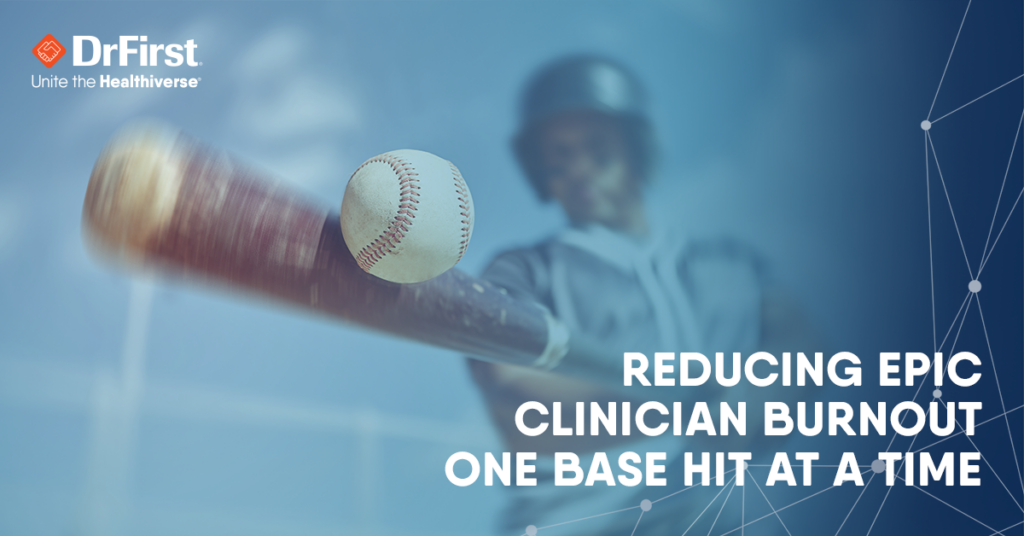DrFirst
Reducing Epic Clinician Burnout One Base Hit at a Time
Health Systems Champion Small Wins for Medication Management Within Their EHRs
Home runs are exciting, but they’re not the only way to win a baseball game. Similarly, when it comes to AI in healthcare, dramatic advancements get a lot of attention, but they’re not the only way to improve efficiency.
“AI or any informatics intervention doesn’t need to be a swing-for-the-fences home run. The bigger bang for your buck is automating the thing that happens 1,000 times a day and doing it in a highly reliable and safe manner,” said Colin Banas, M.D., M.H.A., Chief Medical Officer at DrFirst. “It’s OK to hit singles. I’d rather hit a whole bunch of singles than keep swinging for the fences and miss.”
In a recent webinar, Dr. Banas invited leaders from two health systems using DrFirst’s solutions in their Epic electronic health record (EHR) systems to share some examples of base hits that collectively led to grand slams.
Both Ochsner Health and Emory Healthcare have been using clinical-grade AI to reduce clicks, improve efficiency, and boost provider satisfaction, according to their team stats.
According to Jason Hill, M.D., M.M.M., Ochsner’s Chief Innovation Officer, incomplete medication history data was a big problem.
“All of that free text was sitting in the sig, and I would then have to manually map it on every admission for every single patient,” Dr. Hill said. “Multiply that by about 100,000, and you get a lot of burnout.”
Emory’s Chief Information and Digital Officer, Alistair Erskine, M.D., said he decided to prioritize DrFirst’s solution about six months into the switch to Epic to head off EHR-related fatigue. “If you think about the trough of disillusionment after going live with an EHR, six months is about right,” he added.
“This is low-hanging fruit, yet it has a big impact,” Dr. Erskine said. “Anything that provides better data fidelity in the EHR, especially when it comes to medications, is key.”
Emory has seen a lot of success in lightening the load for providers by delivering the best possible medication history data to clinicians at the point of care. They have had a 13% improvement in adding new home medications within 24 hours of admission and saved 257,000 keystrokes per month, amounting to 72 hours that could be used for other purposes. Emory also reported these improvements:
- Medication history is now available for 92% of patients aged 65 and older
- Clinical-grade AI enhanced 81% of home medication sigs
And the best part? It took only about two weeks to go live, he said.
Two years after going live with DrFirst’s clinical-grade AI solutions, Ochsner has improved approximately 580,000 medical records. Other quality improvement statistics of note:
- Medication history is available for 96% of patients age 65+
- Clinical-grade AI enhanced sigs for 82% of home medications?
Dr. Hill said burnout is why so many providers are deciding to leave their jobs. “Even at large academic institutions like Ochsner and Emory, the primary care team turnover was sometimes north of 10%, which is unbelievable. So, I think we have to be very mindful about the administrative burden we place on doctors and particularly our primary care teams. And again, keeping track of medications is one of the big problems.”
Dr. Hill reminded the audience that AI has been around for a long time.
“It’s reaching a point where the entrance into healthcare has really begun en mass in the last year or so. And if you look at the amount of money and the number of companies that are specifically leveraging AI in clinical care, it’s exploded,” he said.
“One company, though, DrFirst, has been doing it for a while now. And sort of quietly,” Dr. Hill added.
Access the full webinar to catch this expert lineup discussing strategies for redefining medication-related plays within the native Epic EHR playbook, cutting down on the chances of errors in the medication game, and easing the load on the team.


















